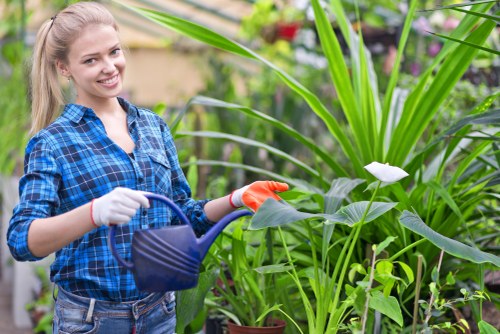Enhancing Your Garden with Effective Fencing and Jet Washing
Introduction to Garden Fencing

Garden fencing plays a crucial role in defining the boundaries of your outdoor space, providing both privacy and security. Whether you're looking to keep pets and children safe or simply want to create a visually appealing landscape, the right fencing can make all the difference.
In addition to its aesthetic value, garden fencing also serves a functional purpose. It helps in protecting your plants from wildlife, prevents unauthorized access, and can even enhance the overall value of your property.
However, maintaining your garden fence is essential to ensure its longevity and appearance. One effective method for maintaining and cleaning your garden fencing is jet washing.
The Importance of Jet Washing for Garden Fencing

Jet washing, also known as pressure washing, is a highly efficient way to clean various surfaces, including garden fencing. Over time, fences accumulate dirt, moss, algae, and other debris that can degrade their appearance and structural integrity.
By using a jet washer, you can remove these build-ups effortlessly, restoring your fence's original look. Regular jet washing not only keeps your fence looking fresh but also helps in preventing the growth of harmful organisms that can cause damage.
Moreover, jet washing is an environmentally friendly cleaning method. It uses high-pressure water, reducing the need for chemical cleaners that can be harmful to the environment and your plants.
Types of Garden Fencing Suitable for Jet Washing

Different types of garden fencing materials respond differently to jet washing. Understanding the compatibility between the cleaning method and your fence material is crucial for effective maintenance.
Wooden Fences
Wooden fences are a popular choice due to their natural appearance. However, they are susceptible to weathering and can harbor mold and mildew. Jet washing wooden fences can remove these contaminants, but it's essential to use the correct pressure setting to avoid damaging the wood.
Metal Fences
Metal fences, such as those made from wrought iron or aluminum, are durable and require less maintenance. Jet washing is ideal for removing rust, grime, and other surface stains, helping to preserve the fence's integrity and appearance.
Vinyl Fences
Vinyl fences are known for their low maintenance needs. Jet washing can be used to clean them, but it's important to avoid using overly high pressure, which can cause warping or other damage to the material.
Benefits of Jet Washing Your Garden Fencing

Jet washing offers numerous benefits for maintaining your garden fencing:
- Efficiency: Jet washing removes dirt and debris quickly, saving time compared to manual cleaning methods.
- Effectiveness: High-pressure water can eliminate stubborn stains, mold, and mildew that are difficult to remove otherwise.
- Preservation: Regular cleaning prevents the buildup of harmful substances that can degrade your fence over time.
- Environmental Friendly: Reduces the need for chemical cleaners, making it a greener choice.
Additionally, jet washing can enhance the curb appeal of your property, making your garden look well-maintained and inviting.
Choosing the Right Jet Washer for Your Garden Fence

Selecting the appropriate jet washer is essential to ensure effective cleaning without causing damage. Here are some factors to consider:
- Pressure Rating: Measured in PSI (pounds per square inch), the pressure rating determines the washer's strength. For delicate materials like vinyl or old wood, a lower PSI is recommended to prevent damage.
- Nozzle Types: Different nozzles provide various spray patterns. A wider spray is suitable for general cleaning, while a narrow spray can target specific areas.
- Portability: Depending on the size of your garden, a portable jet washer might be more convenient for maneuvering around your property.
- Features: Look for features like adjustable pressure settings, detergent tanks, and hose length to enhance usability.
Investing in a high-quality jet washer can make the cleaning process more efficient and extend the life of your garden fencing.
Step-by-Step Guide to Jet Washing Your Garden Fence
Preparing Your Fence for Jet Washing
Before you begin jet washing, it's important to prepare your garden fence to ensure a thorough and safe cleaning process:
- Remove Debris: Clear away leaves, branches, and any other debris from the fence surface.
- Inspect for Damage: Check for loose boards, rust spots, or other damages that need repair before cleaning.
- Protect Plants: Cover nearby plants and flowers to prevent water runoff from harming them.
Taking these preparatory steps will help in achieving the best results while minimizing potential damage to your garden elements.
Jet Washing Technique
Using the right technique is key to effectively jet washing your garden fence:
- Set Up the Jet Washer: Connect the nozzle and fill the detergent tank if necessary. Adjust the pressure settings based on your fence material.
- Start Cleaning: Begin at the bottom of the fence and work your way upward to prevent streaking. Use smooth, even strokes to cover the entire surface.
- Rinse Thoroughly: After applying detergent, rinse the fence with clean water to remove any residue.
- Drying: Allow the fence to air dry completely before applying any sealants or finishes.
Following these steps ensures an effective cleaning process and helps maintain the fence's condition.
Post-Cleaning Maintenance
After jet washing your garden fence, consider applying a protective sealant to enhance its durability. Sealants can protect against moisture, UV rays, and other environmental factors that can cause wear and tear.
Regular maintenance, including periodic jet washing, will keep your garden fence looking pristine and extend its lifespan.
Common Mistakes to Avoid
While jet washing is an effective method for cleaning garden fencing, certain mistakes can lead to damage or ineffective results:
- Using Too High Pressure: High pressure can erode wood, bend metal, or damage vinyl. Always start with a lower setting and adjust as needed.
- Incorrect Nozzle Usage: Using the wrong nozzle can result in uneven cleaning or unnecessary strain on the fence material.
- Neglecting Safety Precautions: Always wear protective gear and be mindful of electrical components near the fence area.
- Skipping Preparation: Not removing debris or inspecting for damage before cleaning can lead to ineffective results or further damage.
Avoiding these common mistakes ensures a safe and effective jet washing process.
Choosing Professional Jet Washing Services
If you're not comfortable performing jet washing yourself, hiring a professional service can be a viable option. Professional cleaners have the expertise and equipment to handle various fence materials safely and effectively.
When selecting a jet washing service, consider the following:
- Experience: Look for companies with a proven track record in garden fencing maintenance.
- Equipment Quality: Ensure they use high-quality, adjustable jet washers suitable for different materials.
- Customer Reviews: Check reviews and testimonials to gauge customer satisfaction and service reliability.
Investing in professional services can save time and ensure your garden fence receives the best possible care.
Environmental Considerations
Jet washing is generally considered environmentally friendly as it minimizes the use of chemical cleaners. However, it's important to be mindful of water usage and runoff to protect your garden ecosystem.
Consider the following tips to enhance the environmental sustainability of your jet washing efforts:
- Use Eco-Friendly Detergents: If using detergents, opt for biodegradable and non-toxic options to reduce environmental impact.
- Control Runoff: Direct the water flow away from plants and delicate garden areas to prevent damage and contamination.
- Water Conservation: Use only the necessary amount of water for cleaning to minimize waste.
By adopting these practices, you can maintain your garden fence effectively while being environmentally responsible.
Safety Tips for Jet Washing
Jet washing involves high-pressure water, which can be hazardous if not handled properly. Follow these safety tips to prevent accidents and injuries:
- Wear Protective Gear: Always wear gloves, safety goggles, and sturdy footwear to protect yourself from debris and high-pressure water.
- Check Equipment: Inspect your jet washer for any damage or leaks before use.
- Avoid Electrical Hazards: Keep electrical outlets and wiring away from the jet washer to prevent electrical shocks.
- Proper Handling: Hold the nozzle firmly and maintain a stable stance to control the high-pressure stream.
Adhering to these safety measures ensures a secure and effective cleaning process.
Cost-Effectiveness of Jet Washing
Jet washing is a cost-effective solution for maintaining garden fencing compared to other cleaning methods. It requires minimal maintenance and can extend the lifespan of your fence, saving you money on repairs or replacements in the long run.
Additionally, renting or purchasing a jet washer can be a one-time investment that provides ongoing benefits for various cleaning needs around your property.
Conclusion
Maintaining your garden fencing is essential for preserving the beauty and functionality of your outdoor space. Jet washing offers an efficient, effective, and environmentally friendly method for keeping your fence in top condition.
By understanding the types of fencing materials, choosing the right equipment, and following proper techniques, you can ensure your garden fence remains a valuable asset to your property.
Whether you decide to undertake the cleaning process yourself or hire a professional service, incorporating jet washing into your regular maintenance routine will enhance the longevity and appearance of your garden fencing.
Contact us today to learn more about our jet washing services and how we can help you maintain a pristine and inviting garden.